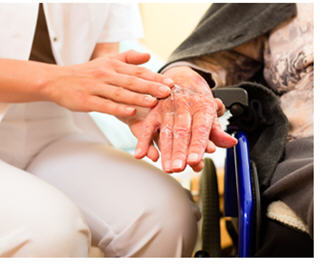
Does Caregiving Cause Psychological Stress? UW Study of Female Twins Says It Depends
Study breaks long-held belief that caregiving directly causes distress
January 30, 2014—When it comes to life's stressors, most people would put caregiving at the top of the list. But according to Peter Vitaliano, a professor of psychiatry and psychology at the University of Washington (UW), there never have been data actually showing caregiving causes psychological distress. So he, and other researchers at the UW conducted a study of about 1,228 female twins, some were caregivers, and some were not. The results were somewhat surprising.
The study, "Does caregiving cause psychological distress? The case for familial and genetic vulnerabilities in female twins," was published in the Annals of Behavioral Medicine in January 2014 and showed that the associations between caregiving and different types of psychological distress (depression, anxiety, perceived stress and perceived mental health) depend largely on a person's genes and upbringing—and less so on the difficulty of caregiving.
Did the person have a history of depression before being a caregiver? If so, "caregiving may be like putting salt on the wound," said Vitaliano. If there's no depression in the past, caregivers don't seem more affected by depression than noncaregivers.
Depression and perceived mental health are the most influenced by genes, said Vitaliano. Anxiety is most related to caregiving, and people who don't get relief from anxiety are more likely to become depressed, he noted.
Perceived stress, meanwhile, is almost exclusively related to the kind of environment a person was raised in, not genetics or caregiver status, he said. If a person grows up in a home where one's parents show lots of avoidance and fear in response to a lost job or sickness , then he or she will likely model that behavior.
Vitaliano said these results break the long-held belief that caregiving directly causes distress. He noted that since 1953 there have been more than a thousand papers on distress among caregivers without any data showing causality.
By examining twin pairs—both monozygotic (identical from same fertilized egg) and dizygotic (fraternal from separate fertilized eggs)—UW researchers assessed the extent psychological distress is related to caregiving, or confounded by common genes and environmental exposure. The study focused exclusively on female twins (408 monozygotic and 206 dizygotic pairs), of which 188 were caregivers. Not enough male caregivers were found to be included in the analyses.
The study comes out as chronic diseases are rising rapidly and Alzheimer's disease is called "the disease of the century"—expected to rise from 5 million victims in 2008 to 12 million in 2030. As a result, more and more people will become caregivers.
Because health care funds are limited, Vitaliano hopes that treatment interventions and policies will be targeted towards caregivers who are at the highest risk.
Vitaliano said he had long predicted that caregiving doesn't directly cause distress.
Based on findings for a paper he and colleagues wrote more than 20 years ago on diathesis—a Greek term for disposition or vulnerability, Vitaliano argues that psychiatric states and psychological outcomes are a function of exposure to stressors and vulnerabilities (early family environment, genetic factors, disposition). How one responds to stressors also depends on a person's resources (coping, social supports, income).
Vitaliano said his past research has also shown that caregivers' stress hormone levels are especially high relative to other caregivers if they are high in dispositions, such as neuroticism and disagreeableness. He has also found that caregivers with chronic illnesses such as heart disease or cancer have more physical problems with their illnesses than do noncaregivers with chronic physical illnesses.
ARTICLE:
"Does caregiving cause psychological distress? The case for familial and genetic vulnerabilities in female twins," Peter P. Vitaliano Ph.D., Eric Strachan Ph.D., Elizabeth Dansie Ph.D., Jack Goldberg Ph.D., Dedra Buchwald M.D. Annals of Behavioral Medicine
